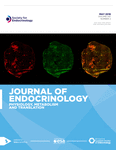Immunological role of vitamin D at the maternal–fetal interface
- 1College of Medical and Dental Sciences, Centre for Women's and Children's Health
2College of Medical and Dental Sciences, Centre of Endocrinology, Diabetes and Metabolism (CEDAM), University of Birmingham, Edgbaston, Birmingham B15 2TT, UK
3Departments of Pediatrics, Biochemistry, and Molecular Biology, Medical University of South Carolina, Charleston, South Carolina 29425, USA
4Reproductive and Vascular Biology Group, Institute of Cellular Medicine, Newcastle University, Newcastle upon Tyne NE2 4HH, UK
5Fetal Medicine Centre, Birmingham Women's Foundation Trust, Birmingham B15 2TG, UK
- Correspondence should be addressed to J A Tamblyn; Email: j.tamblyn{at}bham.ac.uk
Abstract
During pregnancy, immune activity is tightly regulated so that antimicrobial protection of the mother and fetus is balanced with the need for immune tolerance to prevent fetal rejection. In this setting, the maternal–fetal interface, in the form of the uterine decidua, provides a heterogeneous immune cell population with the potential to mediate diverse activities throughout pregnancy. Recent studies have suggested that vitamin D may be a key regulator of immune function during pregnancy, with the fetal–maternal interface representing a prominent target. Among its non-classical actions are potent immunomodulatory effects, including induction of antibacterial responses and modulation of T-lymphocytes to suppress inflammation and promote tolerogenesis. Thus, vitamin D may play a pivotal role in normal decidual immune function by promoting innate responses to infection, while simultaneously preventing an over-elaboration of inflammatory adaptive immunity. Research to date has focused upon the potential role of vitamin D in preventing infectious diseases such as tuberculosis, as well as possibly suppressing of autoimmune disease. Nevertheless, vitamin D may also influence facets of immune function not immediately associated with primary innate responses. This review summarises our current understanding of decidual immune function with respect to the vitamin D metabolism and signalling, and as to how this may be affected by variations in maternal vitamin D status. There has recently been much interest in vitamin D supplementation of pregnant women, but our knowledge of how this may influence the function of decidua remains limited. Further insight into the immunomodulatory actions of vitamin D during pregnancy will help shed light upon this.
- Received in final form 4 December 2014
- Accepted 15 December 2014
- © 2015 Society for Endocrinology











